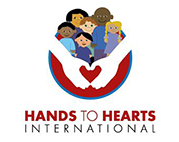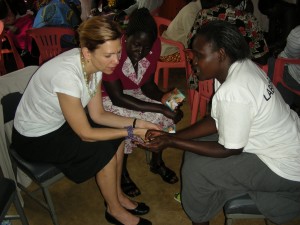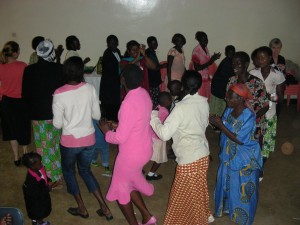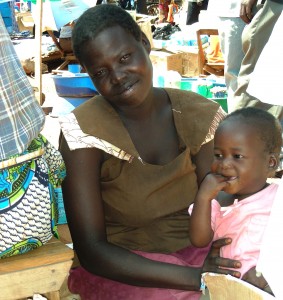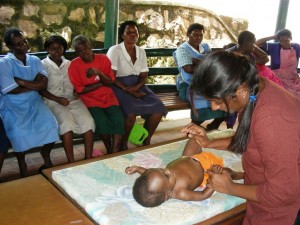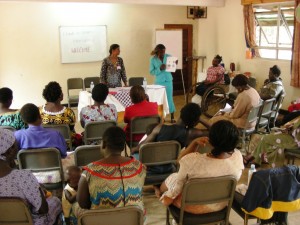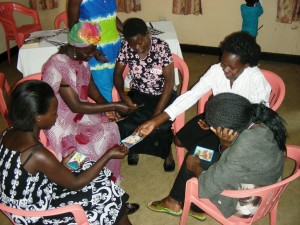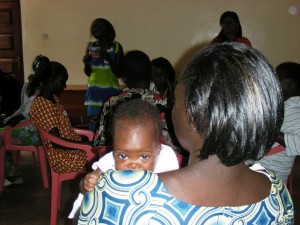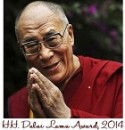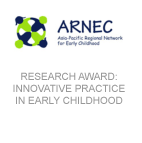Voices from the Field
A three-part series highlighting different perspectives of women involved with Hands to Hearts International. Read their stories.
Part 1: Sasha Rabsey, a donor to HHI, went to Uganda to see first-hand how the program empowers the women it serves
Part 2: From caretakers in India’s orphanages to mothers in the most remote villages, Master Trainer Sujatha Balaje educates and inspires
Part 3: Ugandan community leaders Florence Okun and Norah Awio use the skills they learned during the HHI training when caring for their own families
…………………………………………………………………………………………..
Part 1: Sasha Rabsey, a donor to HHI, went to Uganda to see first-hand how the program empowers the women it serves
by Laura Barker
The most common sentiment Sasha Rabsey heard from the Ugandan women after their two-day training with Hands to Hearts International (HHI) was, “I will never be the same. My children will never be the same. We must teach this to all women.” Sasha, a donor to HHI, was invited by founder/director Laura Peterson to participate in HHI’s pilot program in Kampala, Uganda in February, 2010. What moved her most was that women’s lives will be forever changed by what they learned; the skills they acquired cannot be taken away, and will be passed from woman to woman, further enriching the whole community.
Interested in service-oriented organizations that target women and children, Sasha was introduced to HHI by a friend who told her it was “a sure thing.” She wanted to identify an organization led by someone who truly had a good heart, and immediately recognized that quality in Laura. When Sasha was invited to participate in HHI’s first trip to Uganda, she jumped at the opportunity. “It’s important to me to see the programs I donate to in order to get a deeper understanding of what they do,” she said. “I want to inspire other people to donate to small organizations, and seeing the program’s work in action gives me much greater credibility.”
Once in Uganda, Sasha spent her days participating in the HHI training sessions taught by Mukisa Lydia from Uganda and Master Trainer Sujatha Balaje from India. Lydia translated what Sujatha was saying and did a wonderful job making the women laugh. Together, they taught the participants baby cues (such as how to read the body language and facial expressions of infants) and baby massage, but most importantly, information on nutrition, health, and child development. The women in attendance those two days did not take this education lightly. Unlike American women, who often take learning for granted, Ugandans must struggle to receive an education. Children often go to school during the day, but are also forced to work all evening making money for their families by selling peanuts or other goods in the streets. The participants grabbed at the information and took notes throughout. They made a point to tell all their friends to come back for the second training session, to be held the next day.
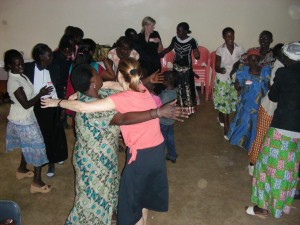
Despite her fatigue, Sasha was asked to stay until the very end to lead the closing discussion on the women’s perceptions of their HHI training. This turned out to be a pivotal moment of her experience. “Not one of them criticized the program content, not even when probed. Americans would have been so quick to point out everything that was wrong. They didn’t say it was just ‘ok.’ They couldn’t control their enthusiasm.”
The women that HHI reaches in Uganda and India do not have access to many resources. They are good mothers and want the very best for their children, but the circumstances of their lives often prohibit them from being able to give their children opportunities. In Kampala, many people live in the slums, and women there often take care of a dozen or more children. Some of these children are their own, while others are grandchildren or the children of other family members who have died. However, even without money or extra resources, women here can make a difference in children’s lives simply by being mothers and caretakers. As Sasha talked to the participants during and after the training, this new found sense of empowerment was what struck her most deeply. Previously these women didn’t realize the importance of their role in their society, but left the training feeling excited and proud. What they heard from HHI was, “YOU have an impact on this child’s life!”
Since her trip to Uganda, Sasha has gotten involved in other international organizations, but says that Hands to Hearts will always be the model she uses when deciding where her money will go. “What Laura does is so amazing because it empowers women simply by imparting information. She’s changing the world, one child at a time.”
Its fair to say, that Sasha’s life will never be the same either.
